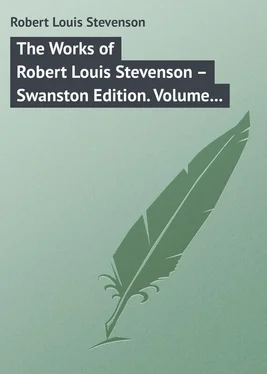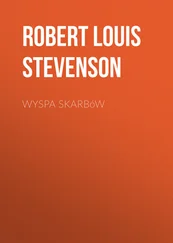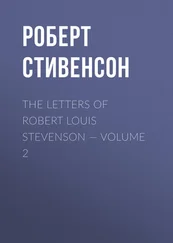Robert Stevenson - The Works of Robert Louis Stevenson – Swanston Edition. Volume 16
Здесь есть возможность читать онлайн «Robert Stevenson - The Works of Robert Louis Stevenson – Swanston Edition. Volume 16» — ознакомительный отрывок электронной книги совершенно бесплатно, а после прочтения отрывка купить полную версию. В некоторых случаях можно слушать аудио, скачать через торрент в формате fb2 и присутствует краткое содержание. ISBN: , Жанр: foreign_prose, на английском языке. Описание произведения, (предисловие) а так же отзывы посетителей доступны на портале библиотеки ЛибКат.
- Название:The Works of Robert Louis Stevenson – Swanston Edition. Volume 16
- Автор:
- Жанр:
- Год:неизвестен
- ISBN:http://www.gutenberg.org/ebooks/30990
- Рейтинг книги:4 / 5. Голосов: 1
-
Избранное:Добавить в избранное
- Отзывы:
-
Ваша оценка:
- 80
- 1
- 2
- 3
- 4
- 5
The Works of Robert Louis Stevenson – Swanston Edition. Volume 16: краткое содержание, описание и аннотация
Предлагаем к чтению аннотацию, описание, краткое содержание или предисловие (зависит от того, что написал сам автор книги «The Works of Robert Louis Stevenson – Swanston Edition. Volume 16»). Если вы не нашли необходимую информацию о книге — напишите в комментариях, мы постараемся отыскать её.
The Works of Robert Louis Stevenson – Swanston Edition. Volume 16 — читать онлайн ознакомительный отрывок
Ниже представлен текст книги, разбитый по страницам. Система сохранения места последней прочитанной страницы, позволяет с удобством читать онлайн бесплатно книгу «The Works of Robert Louis Stevenson – Swanston Edition. Volume 16», без необходимости каждый раз заново искать на чём Вы остановились. Поставьте закладку, и сможете в любой момент перейти на страницу, на которой закончили чтение.
Интервал:
Закладка:
“I find that the keepers have, by some means or another, got into the way of cleaning too much with rotten-stone and oil. I take the principal keeper to task on this subject, and make him bring a clean towel and clean one of the brazen frames, which leaves the towel in an odious state. This towel I put up in a sheet of paper, seal, and take with me to confront Mr. Murdoch, who has just left the station.” “This letter” – a stern enumeration of complaints – “to lie a week on the lightroom book-place, and to be put in the Inspector’s hands when he comes round.” “It is the most painful thing that can occur for me to have a correspondence of this kind with any of the keepers; and when I come to the Lighthouse, instead of having the satisfaction to meet them with approbation, it is distressing when one is obliged to put on a most angry countenance and demeanour; but from such culpable negligence as you have shown there is no avoiding it. I hold it as a fixed maxim that, when a man or a family put on a slovenly appearance in their houses, stairs, and lanterns, I always find their reflectors, burners, windows, and light in general, ill attended to; and, therefore, I must insist on cleanliness throughout.” “I find you very deficient in the duty of the high tower. You thus place your appointment as Principal Keeper in jeopardy; and I think it necessary, as an old servant of the Board, to put you upon your guard once for all at this time. I call upon you to recollect what was formerly and is now said to you. The state of the backs of the reflectors at the high tower was disgraceful, as I pointed out to you on the spot. They were as if spitten upon, and greasy finger-marks upon the back straps. I demand an explanation of this state of things.” “The cause of the Commissioners dismissing you is expressed in the minute; and it must be a matter of regret to you that you have been so much engaged in smuggling, and also that the Reports relative to the cleanliness of the Lighthouse, upon being referred to, rather added to their unfavourable opinion.” “I do not go into the dwelling-house, but severely chide the lightkeepers for the disagreement that seems to subsist among them.” “The families of the two lightkeepers here agree very ill. I have effected a reconciliation for the present.” “Things are in a very humdrum state here. There is no painting, and in and out of doors no taste or tidiness displayed. Robert’s wife greets and M’Gregor’s scolds; and Robert is so down-hearted that he says he is unfit for duty. I told him that if he was to mind wives’ quarrels, and to take them up, the only way was for him and M’Gregor to go down to the point like Sir G. Grant and Lord Somerset.” “I cannot say that I have experienced a more unpleasant meeting than that of the lighthouse folks this morning, or ever saw a stronger example of unfeeling barbarity than the conduct which the – s exhibited. These two cold-hearted persons, not contented with having driven the daughter of the poor nervous woman from her father’s house, both kept pouncing at her, lest she should forget her great misfortune. Write me of their conduct. Do not make any communication of the state of these families at Kinnaird Head, as this would be like Tale-bearing .”
There is the great word out. Tales and Tale-bearing, always with the emphatic capitals, run continually in his correspondence. I will give but two instances: —
“Write to David [one of the lightkeepers] and caution him to be more prudent how he expresses himself. Let him attend his duty to the Lighthouse and his family concerns, and give less heed to Tale-bearers.” “I have not your last letter at hand to quote its date; but, if I recollect, it contains some kind of tales, which nonsense I wish you would lay aside, and notice only the concerns of your family and the important charge committed to you.”
Apparently, however, my grandfather was not himself inaccessible to the Tale-bearer, as the following indicates: —
“In-walking along with Mr. – , I explain to him that I should be under the necessity of looking more closely into the business here from his conduct at Buddonness, which had given an instance of weakness in the Moral principle which had staggered my opinion of him. His answer was, ‘That will be with regard to the lass?’ I told him I was to enter no farther with him upon the subject.” “Mr. Miller appears to be master and man. I am sorry about this foolish fellow. Had I known his train, I should not, as I did, have rather forced him into the service. Upon finding the windows in the state they were, I turned upon Mr. Watt, and especially upon Mr. Stewart. The latter did not appear for a length of time to have visited the lightroom. On asking the cause – did Mr. Watt and him ( sic ) disagree; he said no; but he had got very bad usage from the assistant, ‘who was a very obstreperous man.’ I could not bring Mr. Watt to put in language his objections to Miller; all I could get was that, he being your friend, and saying he was unwell, he did not like to complain or to push the man; that the man seemed to have no liking to anything like work; that he was unruly; that, being an educated man, he despised them. I was, however, determined to have out of these unwilling witnesses the language alluded to. I fixed upon Mr. Stewart as chief; he hedged. My curiosity increased, and I urged. Then he said, ‘What would I think, just exactly, of Mr. Watt being called an Old B – ?’ You may judge of my surprise. There was not another word uttered. This was quite enough, as coming from a person I should have calculated upon quite different behaviour from. It spoke a volume of the man’s mind and want of principle.” “Object to the keeper keeping a Bull-Terrier dog of ferocious appearance. It is dangerous, as we land at all times of the night.” “Have only to complain of the storehouse floor being spotted with oil. Give orders for this being instantly rectified, so that on my return to-morrow I may see things in good order.” “The furniture of both houses wants much rubbing. Mrs. – ’s carpets are absurd beyond anything I have seen. I want her to turn the fenders up with the bottom to the fireplace: the carpets, when not likely to be in use, folded up and laid as a hearthrug partly under the fender.”
My grandfather was king in the service to his fingertips. All should go in his way, from the principal lightkeeper’s coat to the assistant’s fender, from the gravel in the garden-walks to the bad smell in the kitchen, or the oil-spots on the store-room floor. It might be thought there was nothing more calculated to awake men’s resentment, and yet his rule was not more thorough than it was beneficent. His thought for the keepers was continual, and it did not end with their lives. He tried to manage their successions; he thought no pains too great to arrange between a widow and a son who had succeeded his father; he was often harassed and perplexed by tales of hardship; and I find him writing, almost in despair, of their improvident habits and the destitution that awaited their families upon a death. “The house being completely furnished, they come into possession without necessaries, and they go out NAKED. The insurance seems to have failed, and what next is to be tried?” While they lived he wrote behind their backs to arrange for the education of their children, or to get them other situations if they seemed unsuitable for the Northern Lights. When he was at a lighthouse on a Sunday he held prayers and heard the children read. When a keeper was sick, he lent him his horse and sent him mutton and brandy from the ship. “The assistant’s wife having been this morning confined, there was sent ashore a bottle of sherry and a few rusks – a practice which I have always observed in this service,” he writes. They dwelt, many of them, in uninhabited isles or desert forelands, totally cut off from shops. Many of them were, besides, fallen into a rustic dishabitude of life, so that even when they visited a city they could scarce be trusted with their own affairs, as (for example) he who carried home to his children, thinking they were oranges, a bag of lemons. And my grandfather seems to have acted, at least in his early years, as a kind of gratuitous agent for the service. Thus I find him writing to a keeper in 1806, when his mind was already pre-occupied with arrangements for the Bell Rock: “I am much afraid I stand very unfavourably with you as a man of promise, as I was to send several things of which I believe I have more than once got the memorandum. All I can say is that in this respect you are not singular. This makes me no better; but really I have been driven about beyond all example in my past experience, and have been essentially obliged to neglect my own urgent affairs.” No servant of the Northern Lights came to Edinburgh but he was entertained at Baxter’s Place to breakfast. There, at his own table, my grandfather sat down delightedly with his broad-spoken, homespun officers. His whole relation to the service was, in fact, patriarchal; and I believe I may say that throughout its ranks he was adored. I have spoken with many who knew him; I was his grandson, and their words may have very well been words of flattery; but there was one thing that could not be affected, and that was the look and light that came into their faces at the name of Robert Stevenson.
Читать дальшеИнтервал:
Закладка:
Похожие книги на «The Works of Robert Louis Stevenson – Swanston Edition. Volume 16»
Представляем Вашему вниманию похожие книги на «The Works of Robert Louis Stevenson – Swanston Edition. Volume 16» списком для выбора. Мы отобрали схожую по названию и смыслу литературу в надежде предоставить читателям больше вариантов отыскать новые, интересные, ещё непрочитанные произведения.
Обсуждение, отзывы о книге «The Works of Robert Louis Stevenson – Swanston Edition. Volume 16» и просто собственные мнения читателей. Оставьте ваши комментарии, напишите, что Вы думаете о произведении, его смысле или главных героях. Укажите что конкретно понравилось, а что нет, и почему Вы так считаете.










